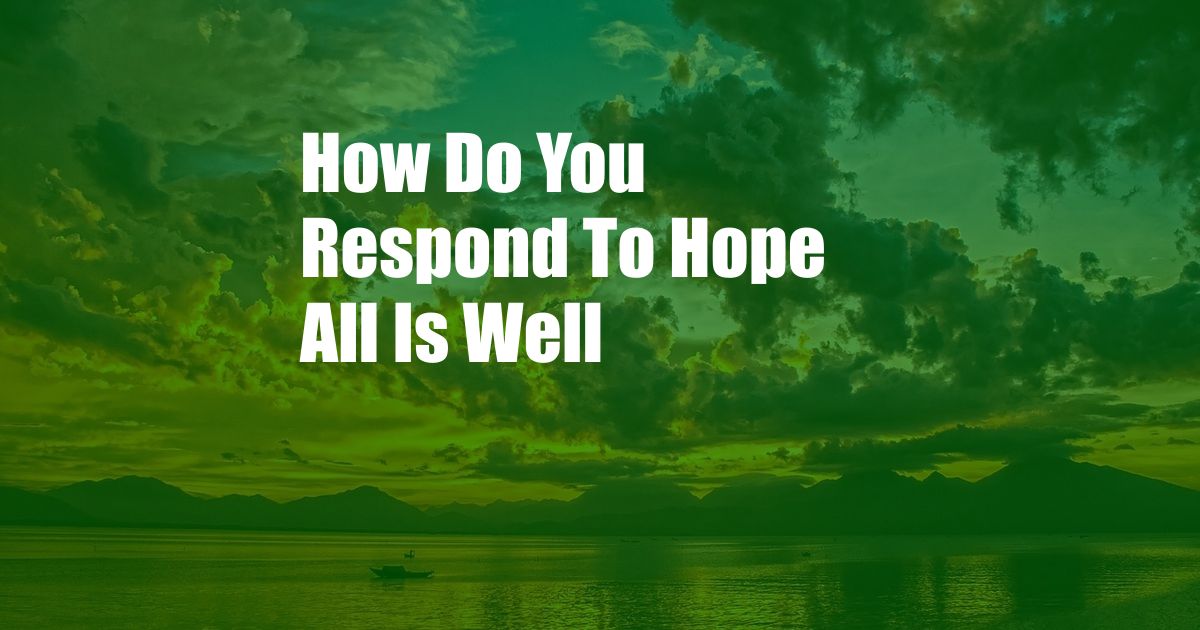
How Do You Respond to “Hope All Is Well”?
In the tapestry of human interactions, expressions of well-being hold a significant place. When someone inquires, “Hope all is well,” it’s not just a mere pleasantry but a heartfelt wish for our welfare. Our response to this inquiry, therefore, should be imbued with sincerity and warmth. Whether it’s a casual greeting or a genuine concern, understanding the nuances of how to respond can strengthen our communication and foster meaningful connections.
To navigate this social etiquette with grace, it’s crucial to consider the context of the conversation and the relationship we share with the person asking. Our response should align with the tone and intent of their inquiry to convey both our appreciation and respect.
The Art of Acknowledgment
A Gracious Response
A simple yet polite response to “Hope all is well” is to acknowledge the well wishes and reciprocate with similar sentiments. A phrase like, “Thank you, I’m doing well. I hope you are too,” conveys gratitude for their concern and extends our own well wishes in return. This response demonstrates empathy and sets a positive tone for the conversation.
If we’re feeling particularly jovial or enthusiastic, we can add a touch of warmth to our response: “I’m doing great, thanks for asking! It’s been a busy yet fulfilling week.” This shows that we appreciate their inquiry and are genuinely in a positive state of mind.
A Relatable Response
Sometimes, we may not be experiencing the best of times when someone asks, “Hope all is well.” In such instances, honesty can be the most genuine response. We can acknowledge their well wishes while also briefly sharing our current situation, without going into excessive detail.
For example, “Thank you for asking. I’m facing a bit of a challenge at the moment, but I’m staying positive and working through it.” This response conveys that we appreciate their concern, are not shying away from our difficulties, and maintain a hopeful outlook.
Navigating Complexities
The Nuances of Context
The context of the conversation plays a vital role in determining the appropriate response. If the inquiry comes from a close friend or family member, we can be more open and personal in our response. Sharing a bit more detail about our current situation, whether positive or negative, can deepen the connection and foster a genuine exchange.
On the other hand, if the inquiry is from an acquaintance or colleague, a more formal and brief response may be more suitable. A simple “Thank you, I’m well” or “I’m doing alright, thank you” can suffice, maintaining politeness while respecting professional boundaries.
Tips for Navigating Cultural Differences
It’s important to note that cultural differences may influence how we respond to inquiries about our well-being. In some cultures, it’s customary to express gratitude and humility even if things are not going well. In other cultures, a more direct and open expression of our challenges may be the norm.
When interacting with people from different backgrounds, being culturally sensitive and adapting our response to their customs can help create a mutually respectful and positive communication experience.
FAQ on “Hope All Is Well”
- What is an appropriate response to “Hope all is well”?
A polite and sincere acknowledgment, reciprocating well wishes or briefly sharing our current situation (depending on the context). - Is it always necessary to be honest about our well-being?
While honesty is often appreciated, it’s not always necessary to share personal struggles in detail. A brief acknowledgment of our situation without going into excessive depth can suffice. - How can I express gratitude for their concern?
Using phrases like “Thank you for asking” or “I appreciate your well wishes” conveys our appreciation for their concern. - What if I’m not sure how to respond?
A simple “Thank you” or “I’m doing okay” can be a suitable response in most situations. - Is it appropriate to respond with a question about their well-being?
Yes, reciprocating the concern can be a polite gesture, especially if we have a close relationship with the person.
Conclusion
Responding to “Hope all is well” is a delicate art that requires sensitivity, empathy, and cultural awareness. By understanding the nuances of different contexts, choosing appropriate responses, and embracing the spirit of genuine connection, we can not only fulfill social etiquette but also strengthen our relationships and create meaningful interactions.